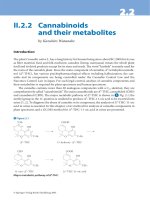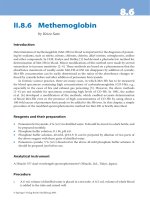Genes, drugs and food doc
Bạn đang xem bản rút gọn của tài liệu. Xem và tải ngay bản đầy đủ của tài liệu tại đây (378.96 KB, 35 trang )
A Lancaster – Cardiff collaboration
Genes, drugs and food
Ruth Chadwick
Director, CESAGen
Lancaster University
Outline
•
New technologies have led to revisiting of
the individual-collective relation in public
health
•
…and to questions of their impact on health
inequalities
Issues
•
Opportunity costs
•
Access and benefit-sharing
Choice?
•
The upholding of ‘choice’ coincides with new
forms of stratification
•
No consistency in argument
•
Examples: nutrigenetics, obesity and functional
foods
Two White Papers (UK): two
strategies
•
…we will learn more about the genetic
features of common diseases such as
heart disease and diabetes and the way
external factors such as diet and
smoking interact with our genes to
increase the likelihood of developing a
given disease
DH continued
There will then be the option to test people
for a predisposition to disease, or a
higher than normal risk. Treatment,
lifestyle advice and monitoring aimed at
disease prevention could then be tailored
appropriately to suit each individual
Our Inheritance, Our Future
Choosing Health (2004)
•
The White Paper sets out a strategy for
action based on the principles of informed
choice, personalised services and
collaboration between Government, the
NHS, industry and wider society.
Choosing Health identifies how people can
be empowered to make healthy choices. It
sets out how health can be supported and
improved in key environments such as
retail outlets, local communities and the
workplace.
Public engagement
•
2003 – traces of deficit model
•
2004 – shaped by public consultation
Key questions
•
How do these strategies relate, if at all?
•
Impact on health inequalities?
•
What notions of ‘personalised’ health care
and ‘choice’ are at stake?
•
2004 White Paper talks about false
dichotomy ‘nanny state’ – ‘freedom’ can
imply neglect
Key example
•
Food and diet
•
Nutrigenetics
•
Food labelling
•
Obesity; diabetes
Nutrigenetics
•
The study of individual differences at the
genetic level (SNPs) influencing response
to diet
Nutrigenomics
The application of genomics in
nutrition research, enabling
associations to be made
between specific nutrients and
genetic factors
Information leading to
applications
•
Understanding of how nutrition
influences metabolic pathways
•
Understanding of how this goes awry in
diet-related diseases
•
Understanding of how individual
genotypes are influencing factors
The context
•
Public perceptions of genetics
•
Novel foods, e.g. gm
•
Prevailing ethical paradigms:
–
individualism and choice
Public health
•
Will nutrigenomics have significant public
health benefits?
•
Differences between nutrigenomics and
pharmacogenomics
Pharmacogenomics
•
Avoidance of adverse reactions
•
Genetically informed prescribing
•
Greater safety and efficacy
•
Patient stratification?
Testing – empowerment?
•
Single gene disorders
–
Huntington’s disease
•
Susceptibility testing
–
Identifying recessive genes
–
Identifying genetic makeup which may
increase risk of developing common diseases
•
Pharmacogenetic testing
–
Medicine response test
•
Nutrigenetic testing
Screening
•
Testing versus screening
•
Criteria for introduction of screening
–
Important condition
–
Acceptable and reliable test
–
Scope for action
Conditions
•
PKU
•
Diabetes
Obesity
•
Genetic factor A – predisposition to obesity with
food x
•
A case for screening?
•
Importance/Scope for action?
Individualism and public health
Personal pills and personalised diets?
The more individualised the promises, the more
collective action is required
Acquisition of information
•
Association studies
–
Population groups
–
Specific disorders
•
National dietary surveys
•
Genetic databases
WHO
•
…the justification for a database is more
likely to be grounded in communal value,
and less on individual gain……it leads to
the question whether the individual can
remain of paramount importance in this
context
WHO
•
…the achievement of optimal advances in
the name of the collective good may
require a reconsideration of the respective
claims so as to achieve an appropriate
balance between individual and collective
interests, including those of ethnic
minorities, from a multi-cultural
perspective









